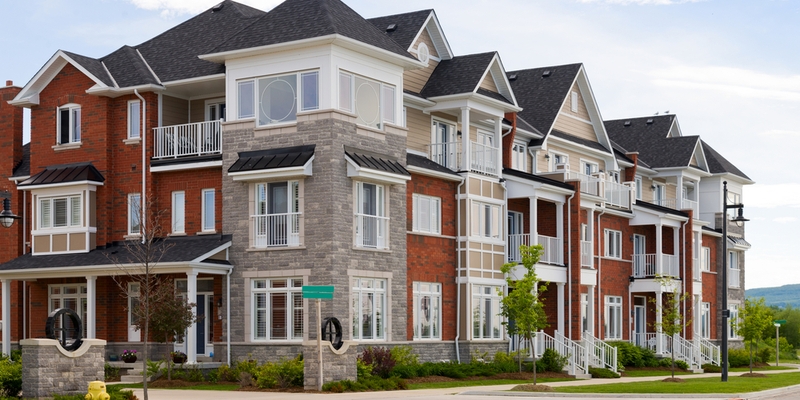
If you are not redirected within 30 seconds, please click here to continue.
Samedi: 10h – 16h HAE

If you are not redirected within 30 seconds, please click here to continue.
If you are not redirected within 30 seconds, please click here to continue.
Does your townhouse need home insurance or condo insurance?

This article has been updated from a previous version.
If you own a townhouse, do you need home insurance or condo insurance to protect your property and possessions? Though townhouses are similar to condominiums, the answer lies in the layout of your dwelling and its ownership structure.
Understanding the differences between these types of ownership can help you determine the right insurance coverage for your needs.
What is the difference between a condo and a townhouse?
A condo refers to a type of ownership, typically units in large buildings. Condo owners own their units, but they also co-own the common areas within the building such as the lobby, hallways, roof, and parking garage (if there is one).
Condo owners are responsible for paying for the maintenance of their unit, its related property taxes, as well as any monthly condo fees that fund the upkeep of common areas and amenities. They also need to insure the interior of their units –- the condo corporation insures the structure, property, and common areas.
A townhouse or row house, in comparison, is a multi-floor home that shares common walls and a roof with adjacent properties. Townhouses may also have attached private garages.
Detached and semi-detached homes, duplexes, and townhouses are usually considered freehold ownership. Unlike condo owners, most townhouse owners own the interior and exterior of their homes as well as the property it is on outright, and they are responsible for its upkeep and the property taxes associated with it. Therefore, townhouse owners need to insure the structure and property.
However, some townhouses are also considered condominiums, whereby owners own a percentage of the condo corporation and not the land. These are known as condo townhouses.
Depending on the type of townhouse, there may be a homeowners’ association or condo corporation that governs what types of renovations, if any, that residents can and cannot undertake.
Condo building corporations may impose stricter rules and regulations on its residents than a townhouse owners association. Both offer a hybrid lifestyle blending home ownership with community living.
What does townhouse insurance include?
A townhouse insurance policy generally covers a wide range of costs and damages to ensure your home and belongings are protected. Here’s what it typically includes:
- The interior and exterior walls
- Carpets, floors, cabinets and countertops
- Plumbing and electrical infrastructure
- The roof
- The land on which the townhouse sits
- Personal liability protection
- Your personal belongings
- Improvements or renovations you make to the townhouse
- Replacement costs and additional living expenses coverage
Most policies include protection against risks such as fire, smoke damage, lightning strikes, windstorms, hail, theft, vandalism, and even damage caused by vehicles.
You can also tailor your coverage by adding optional protections like:
- Overland flood insurance for flooding caused by heavy rainfall or river overflow
- Sewer backup protection to cover damages from backed-up drains or sewers
These add-ons help safeguard your home from specific risks that a standard policy may not include. Additionally, you can customize your deductibles when setting up your policy, giving you more control over your coverage.
Read more: How much home insurance coverage do you actually need?
What does condo insurance include?
A condo insurance policy is designed to cover your individual unit and protect you from unexpected costs. Here's what a standard policy typically covers:
- The interior walls of your unit
- Carpets, floors, cabinets and countertops
- Plumbing and electrical infrastructure
- Personal liability protection
- Your personal belongings (including those kept in a storage locker)
- Improvements or renovations within the unit that you make
- Replacement costs and additional living expenses coverage if you need to temporarily relocate due to damage
Most condo policies protect against risks such as fire, smoke damage, lightning strikes, windstorms, hail, theft, and vandalism. You also have the flexibility to choose your deductibles when setting up your policy, giving you some control over your coverage and costs.
It’s important to note that the condo corporation’s insurance policy typically covers:
- The building’s main structure
- Shared property and common areas, like lobbies or amenities
If an insurance claim is made, all unit owners often share the cost of the deductible. To avoid any surprises, ask your condo corporation about the details of its policy, including the coverage it provides and the associated maintenance fees.
What kind of home insurance policy do you need?
If you live in a townhouse complex and pay maintenance fees, chances are your property is classified as a condominium. This means you'll need a condo insurance policy, which is often more affordable than insurance for a detached home.
However, it’s essential to confirm this. Check with your real estate agent or review the property title to make sure you're getting the correct coverage.
Once you know the type of insurance you need, compare coverage and premiums to find a policy that suits your needs and budget.
The right insurance protects your home, belongings, and wallet in times of need. Understanding your property’s ownership type and comparing options empowers you to make the best choice for your situation.
Don't waste time calling around for condo insurance
Use RATESDOTCA to shop around and compare multiple quotes at the same time.
Finding the best condo insurance coverage has never been so easy!
Get money-saving tips in your inbox.
Stay on top of personal finance tips from our money experts!










